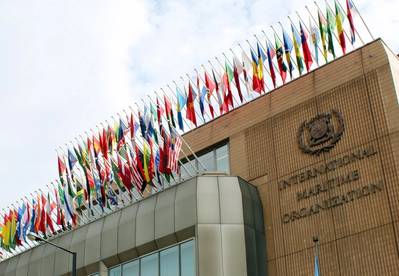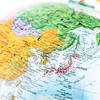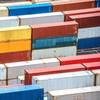On Earth Day, Pacific leaders queued among 175 countries to sign the Paris Agreement in New York. Earlier that day in London, the International Maritime Organization (IMO), the United Nations Framework Convention on Climate Change (UNFCCC)’s sister UN specialized agency, met to discuss shipping’s “fair share” in reducing greenhouse gases in a far less publicized and not nearly as successful climate change debate.
Pacific and European nations have been pressing the IMO since before Paris to join the “coalition of higher ambition”. In the lead up to Earth Day the IMO stumbled but didn’t quite fall. It has agreed to reopen the debate at their next meeting in October.
Introducing the Pacific’s submission, Ambassador Moses Mose of Solomon Islands, said, “The same countries that celebrated in Paris must now follow through on that commitment, and demonstrate their conviction through action at IMO . . . On the topic of GHG, the shipping sector is at the start of its own journey. But unlike the UNFCCC with its clear and scientifically derived destination – well below 2 degrees, aiming for 1.5 – we are concerned that with shipping, we currently risk not knowing where we are going.”
“Today, in this room, we have the opportunity to demonstrate that the IMO is the competent organization to control shipping’s GHG, and that our signatures in New York this week are not just ceremonial, but equate to meaningful action,” Mose continued. “Today, we can demonstrate that we have understood the message and that we are willing to act upon our responsibility.”
If shipping were a country it would contribute as much GHG as Germany or Japan. But it is the projected rate of increase that is of greatest concern. Without strong leadership to decarbonize, ship emissions could increase by 50-250 percent by 2050, according to IMO 3rd GHG report 2014. It simply makes efforts by other sectors to stay within 1.50C mission impossible.
Last week the Solomon Islands led a determined Pacific voice including the Marshall Islands, Fiji, PNG and Vanuatu in a coalition with much of Europe, and other developing states led by Mexico and Liberia with the industry’s support, for IMO to agree on a plan to work out what shipping’s “fair share” should be.
Strong opposition came from BRICs (the grouping composed of Brazil, Russia, India, China and South Africa), Saudi Arabia and several South American countries concerned about the negative impacts of any commitment to mitigate shipping’s GHG emissions. In a compromise, the IMO agreed to table a further debate to its long-term objectives and response to the Paris Climate Agreement – but not until October.
Across the Atlantic, leaders of the same countries pledged to work tirelessly and collectively to see the Paris Agreement implemented. Yet the world had failed to be so progressive in London. While progress is being made in the IMO, it has come at a much slower rate. However, there is now a global spotlight being played, not least because of the determination of Pacific countries. President Heine of the Republic of Marshall Islands, reminded her colleagues in her address in New York on the need for sustained action by the IMO. The next IMO meeting in October will be heavily attended and watched by many.
The strongest opposition to control of shipping emissions came from one of the smallest Pacific countries – the Cook Islands, in complete reversal of their position on climate change in Paris, and in opposition to many other Pacific Island countries at the IMO. “Knowing the position of the Cook Islands on climate change and their strong engagement at COP21 in Paris, both in the negotiations and at side-events, this appears a contradiction – as if their representatives in London were disconnected from the climate negotiations and the Paris Agreement,” said PIDF’s Secretary General François Martel.
The Pacific Islands Development Forum (PIDF) has long supported the Pacific’s lead in the IMO. The Suva Declaration on Climate Change, signed by Pacific leaders at the 3rd PIDF summit in 2015, called on all UN bodies to take decisive action on shipping emissions. University of the South Pacific researchers have coordinated a full team of technical support for the coalition in conjunction with leading international universities. “We can be confident we have access to the best available science on this issue,” Martel said.
France joined Fiji and RMI in speaking strongly for the IMO to take a progressive approach and told the IMO that “We must put together a plan and timeframe for GHG reduction. Or be judged as impotent.” The incoming Secretary General of the IMO has called climate change the central issue for the IMO to address. He pushed hard for this not to be thrown out at this stage, suggesting it is “unwise to kill the thinking/idea…”
Throughout the day, IMO’s commitment and contribution in relation to the Paris Agreement was widely recognized by the majority of the delegations. Many also emphasized that IMO was the place to undertake a debate on shipping’s GHG emissions. But they were seemingly oblivious to the contradiction this posed with the position taken by several states to indefinitely delay further debate of GHG.
The progressive “Coalition d’alignement” (in French) led by Solomon Islands and RMI included the EU, many in industry and many vulnerable states. Two of the three biggest flags (Liberia and Marshall Islands) and seven of the 10 biggest flags (except Panama, Hong Kong and China) were in support. The United States didn’t come out in support of the progressive coalition, preferring their existing energy efficiency approach, but did not obstruct either.
The Pacific nations’ actions in London on Earth Day keep alive the hope that shipping can play its part in delivering the Paris Agreement. The next debate will be in October, where it will be essential for shipping to determine its fair share of the climate change burden and act now. It is essential the Pacific find a united voice on this matter.
Three months after Paris, IMO failed the first test. In October will come its opportunity to pass the re-sit – while the world is watching.















